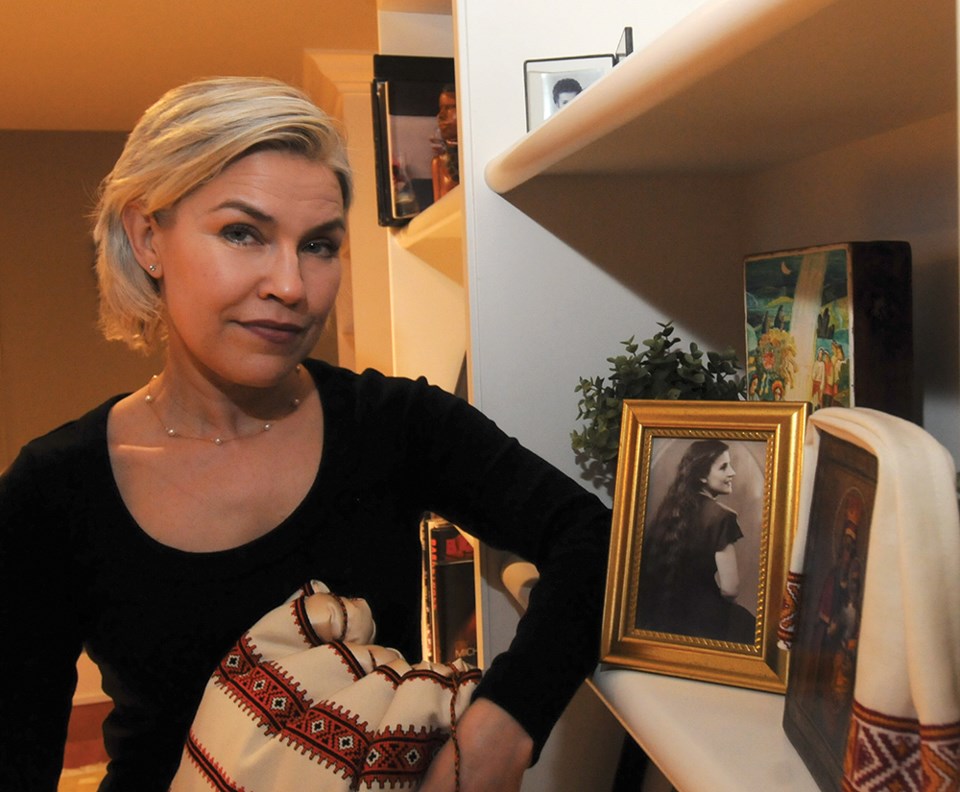A North Vancouver school principal who has been watching the war in Ukraine unfold with increasing worry said her family members aren’t ready to abandon their country despite constant danger and exhaustion.
Lisa Upton, a North Vancouver resident, has deep family roots in Ukraine. Upton speaks Ukrainian, has taught in the country and her family has long been a part of the political movement to protect Ukrainian identity.
Situation 'desperately sad'
For the past month, however, the situation in that country has been “desperately sad,” said Upton, who keeps in touch with family members through messaging apps and through an aunt in Toronto.
One of her cousins, now in his 60s, is still living in downtown Kyiv with his wife and refuses to leave the city.
The wife’s elderly parents live in the area of a large shopping mall that was bombed, said Upton. “Their building is still standing but all of the windows in the building were blown out.” Her cousin tried to get his in-laws to come and live with them, she said. But they refused. “So he went and boarded up their windows.”
“They’re just really committed to staying. They think the Russians should leave.”
Younger members of the family, especially those with children, have fled to safer regions of Ukraine, like many other civilians.
One family has gone west to a town in the Carpathian mountains. Another has gone to a village near the western city of Ivano-Frankivsk, where Upton’s family is from. One relative who is a nurse in Ivano-Frankivsk is still in the city, said Upton, but has started making plans to leave with her three children in the event Russian forces begin bombing civilian areas.
One of Upton’s cousins, who she messaged recently,has fled southwest to the city of Chernivtsi near the Romanian border, taking her sisters' children with her. Shops and services there are functioning normally, the cousin told Upton. But back in Kyiv, where the sisters and their husbands remain, one sister's house in the suburb of Hostomel, just north of Kyiv, has been completely destroyed, said Upton. Hostomel is very close to Bucha, where atrocities against civilians who had been tortured and executed were revealed this week after Russian forces retreated.
Civlians exhausted by 'wear and tear of war'
After more than a month of war, the civilian population is tired, said Upton. The cousin she’s closest to has told her, “She’s just tired of going into the bomb shelter, into the basement and she doesn’t want to do it anymore . . . That’s the wear and tear of war. It’s really sad to hear.”
Currently Upton said her family in Canada is still able to wire their relatives in hard hit areas of the country small amounts of money. “We've been sending $100 at a time,” she said, but bank lineups for banks that are still open in cities like Kiev are very long.
Phone connections into Ukraine to get news of the family have been more difficult to get, she added.
Her family isn’t optimistic about the chances of a negotiated settlement.
Humanitarian convoys targeted
“The corridors that are supposed to be humanitarian corridors to evacuate people, those aren't holding. So it's just another way that people are getting injured, because they're continuing to bomb convoys of people who are leaving, so that that doesn't inspire a lot of trust,” said Upton.
In the beginning of the war, “They were more hopeful that there would be more international aid coming,” she said. But now, with Western countries ruling out any actions that would put them in direct conflict with Russia, “There's a very strong sense [among Ukrainians] that we need to fend for ourselves. No one's coming.”
Canada, B.C. increase supports for refugees
Ukrainians remain grateful for both military supplies and humanitarian aid that’s been coming from Canada for refugees, she said.
Last week, Canada announced it is increasing temporary federal support for Ukrainian refugees who come to Canada. Support will include language training, orientation about life in Canada and other mentoring and skills training for Ukrainians who arrive under a special accelerated path to temporary residence in the country.
The province also announced it is expanding services and supports for Ukrainians expected to arrive in B.C. with a dedicated online portal where newcomers can connect to free services to find housing, sign up for health-care coverage, look for a job, sign children up for school and learn about other community services. The portal is also available in Ukrainian and Russian languages. The website can also be used by British Columbians who want to offer support to Ukrainians including offering housing, employment opportunities or donations.
Most Ukrainians coming to B.C. are expected to arrive through the Canada-Ukraine Authorization for Emergency Travel program. Under this new federal program, Ukrainians and their family members will be allowed to stay in Canada as temporary residents for as long as three years, and Ukrainians will be allowed to apply for a three-year open work permit.As of March 30, Canada had received more than 91,000 applications from Ukrainians under the program. The province has estimated B.C. could receive up to 20 per cent of arriving Ukrainians.



